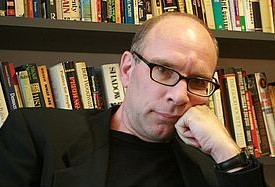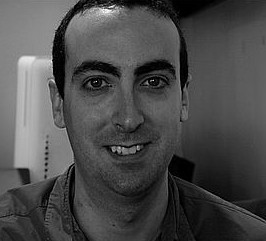Blog Archives
Blogger’s picks for MWF 2011
I’ve started circling events in the MWF program. Terrifying and all-encompassing though the red pen carnage may seem, there are some events I know I won’t miss.
 Usually my list is fiction-heavy, but thanks to the growing hubbub about digital news and the recent resurgence in interest about the ethics of journalism, New News 2011 has been a focus of my festival planning this year. New News 2011 will bring together media leaders and commentators from all over Australia and the world, including New York University media critic Jay Rosen, chair of the Public Interest Journalism Foundation Margaret Simons, and ABC Managing Director Mark Scott. Rosen’s Big Ideas: Why Political Coverage is Broken promises electrifying analysis of journalism today, and Media Leaders Held to Account offers one intrepid participant the opportunity to share the stage with Mark Scott and Crikey‘s Sophie Black (to be in the running, submit a question at OurSay).
Usually my list is fiction-heavy, but thanks to the growing hubbub about digital news and the recent resurgence in interest about the ethics of journalism, New News 2011 has been a focus of my festival planning this year. New News 2011 will bring together media leaders and commentators from all over Australia and the world, including New York University media critic Jay Rosen, chair of the Public Interest Journalism Foundation Margaret Simons, and ABC Managing Director Mark Scott. Rosen’s Big Ideas: Why Political Coverage is Broken promises electrifying analysis of journalism today, and Media Leaders Held to Account offers one intrepid participant the opportunity to share the stage with Mark Scott and Crikey‘s Sophie Black (to be in the running, submit a question at OurSay).
One fiction writer who has raced up my list of to-sees is Steve Hely, whose How I Became a Famous Novelist is a magnificently titter-inducing work of satire. The novel tells the story of a down-and-out college entrance essay writer who cracks the code of the best-selling literary novel (‘Rule 16: Include plant names’). As well as being a novelist, Hely writes for television programs 30 Rock, The Office and American Dad, and it shows in his mortifyingly acute descriptions (‘The only other customer at the coffee bar…was tearing apart a cranberry-raisin muffin with frantic violence. Crumbs were strewn across her open copy of The Jane Austen Women’s Investigators’ Club.’) Not for reading die-hards who cannot laugh at themselves. Hely is appearing in TV Tales, with Wendy Harmer, Tim Ferguson and many more TV writers; The Morning Read, always a lovely way to ease yourself into festival season; The Comedy of Publishing, and Friday Night Live.
titter-inducing work of satire. The novel tells the story of a down-and-out college entrance essay writer who cracks the code of the best-selling literary novel (‘Rule 16: Include plant names’). As well as being a novelist, Hely writes for television programs 30 Rock, The Office and American Dad, and it shows in his mortifyingly acute descriptions (‘The only other customer at the coffee bar…was tearing apart a cranberry-raisin muffin with frantic violence. Crumbs were strewn across her open copy of The Jane Austen Women’s Investigators’ Club.’) Not for reading die-hards who cannot laugh at themselves. Hely is appearing in TV Tales, with Wendy Harmer, Tim Ferguson and many more TV writers; The Morning Read, always a lovely way to ease yourself into festival season; The Comedy of Publishing, and Friday Night Live.
Finally, the world has been keeping a close eye on the Middle East this year, with a chain of political upheavals generating debate, concern and hope. As Egyptian commentator and journalist Mona Eltahawy has said, ‘Tunisia allowed us to imagine a future beyond our dictators. And everybody was watching Tunisia. And then everybody started watching Egypt and then Bahrain and Yemen and Libya and Syria. So, everybody’s paying attention.’ I’m looking forward to Eltahawy’s analysis in Big Ideas: The Roots of the Egyptian Revolution – From Tahrir Square to Liberation From Dictatorship. You can see Eltahawy commenting on the trial of Hosni Mubarak here, and on the Syrian blogger hoax here.
What are your festival picks?
On uprising
Since December 2010, the Arab world has been in uprising. Beginning in Tunisia, one man’s act of self-immolation became the catalyst for a wave of political protests that spread throughout the Middle East and North Africa over the following months.
On January 25, 2011, the population of Egypt took to the streets, protesting police brutality and abuse of power, demanding the resignation of the Ministry of Interior and accountability from President Hosni Mubarak’s government. After 18 days of protests throughout the country, during which the Mubarak regime declared curfews, deployed the military and shut down internet access in attempts to cripple the escalating unrest, Mubarak himself finally resigned.
During the 18-day uprising, a journalist by the name of Mona Eltahawy started appearing on radio and television broadcasts across the United States, giving her perspective on the events unfolding in Cairo. A New York-based commentator, Eltahawy was born and raised in Egypt and moved to the United States in 2000. Her writing has appeared in the Washington Post, International Herald Tribune, Toronto Star, Israel’s The Jerusalem Report and Denmark’s Politiken among others, and she is a frequent guest on television and radio. Eltahawy speaks and writes frequently on Islam and feminism, and has attracted criticism for some of her politics, particularly her support for the Libyan intervention and the recent burqa ban in France. Her high profile during the Egyptian uprising led to feminist website Jezebel dubbing her ‘the woman explaining Egypt to the West’. Determined and uncompromising, Eltahawy is a compelling figure in the line-up of female political voices staking out their territory at the 2011 Melbourne Writers Festival.
Mona Eltahawy will be speaking at the MWF as part of the Big Ideas programme. She will be speaking on The Roots of the Egyptian Revolution: From Tahrir Square to Liberation from Dictatorship on September 2, and discussing the Arab Spring with Joseph Braude, Amin Saikal and Louise Adler on September 3.